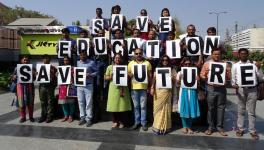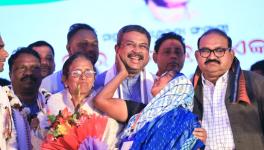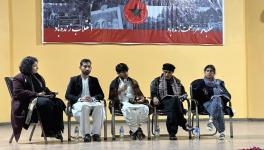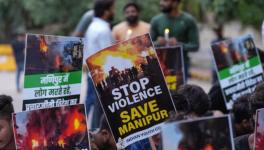Public Hearings on NEP Face Protests Across Tamil Nadu
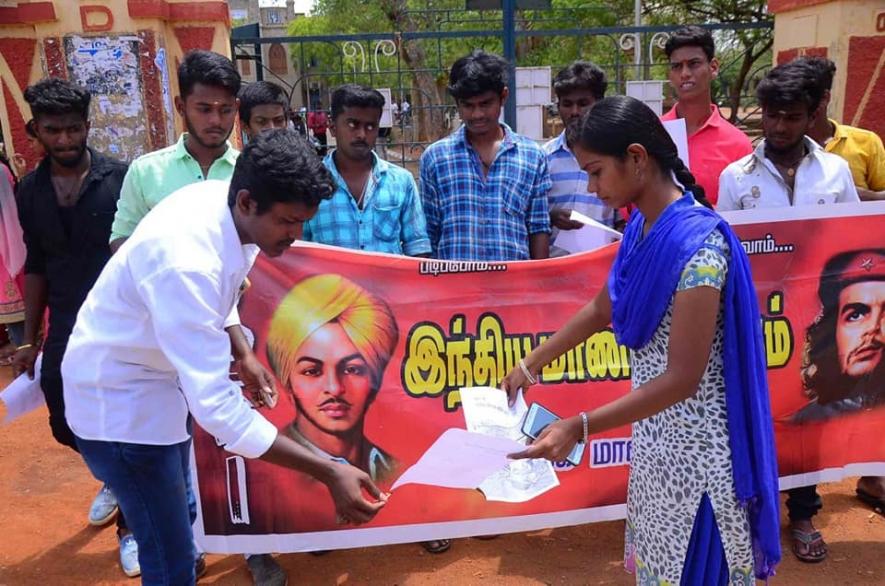
The public hearings on the draft National Education Policy (NEP) seem to be a secret affair in Tamil Nadu. There are reports of such secret hearings being interrupted by several political and social welfare organisations citing the lack of transparency of the so called hearings. The members of Thanthai Periyar Dravidar Kazhagam (TPDK) forced the cancellation of one such hearing in Kendriya Vidyalaya in the IIT-Madras campus on Monday, July 22.
The union government has been sweating hard to get the draft accepted without giving much time for the stake holders to voice their opinion. The political parties and civil society organisations have demanded that December 31st be set as the deadline for submission of recommendations on the draft. In fact, the government was forced to extend the submission of opinion by one month to July 31.
Hearing Stopped in Coimbatore
The TPDK members managed to get a hearing cancelled which was held in PSG Institute of Technology in Coimbatore. The members alleged that the hearing was held secretly by the school education department without any invitations to students, parents or even the media. The general secretary of TPDK, K Ramakrishnan while addressing the media accused the union government of trying to push the draft by holding secret meetings in order to avoid the general public from voicing their concerns about the draft.
Also read: New Education Policy: RTE Pruned, Research Market Based
He also said, “The government should invite students, teachers, professors and senior academicians for the hearing. The present meeting seems to be a conspiracy by allowing only the individuals favouring the draft to take part which does not make any sense. We will continue to interrupt such meaningless meetings.”
TNPWAA, DYFI, SFI Protest in Tiruchi Public Hearing
In another instance, Tamil Nadu Progressive Writers’ and Artists’ Association (TPWAA), Democratic Youth Federation of India (DYFI), Students’ Federation of India (SFI) and other organisations including Viduthalai Chiruthaigal Katchi and Makkal Athikaram protested against the public hearing held at St. Joseph’s College. N Muthu Nilavan, state vice president of the TPWAA told, “The scheme of conducting public exams for even the primary school children and semester pattern exam for high and higher secondary students will deter their confidence. The move of the union government to impose Hindi as the third language cannot be accepted.”
“The public hearings must be conducted in public places with proper publicity and participation of all the stake holders. Secret meetings like this should not be encouraged,” he added.
Also read: Tamil Nadu Parties Cry Foul Over National Education Policy on Language Formula
Finally, the officials present claimed that the meeting was convened to discuss about the NEP and was not a public hearing. They also said that the invitation was printed as a public hearing instead of discussion. Earlier, SFI had conducted a nationwide protest against the NEP by burning the draft policy.
Draft Recommends Centralisation of Education
Academicians and educationalists continue to slam the union government for the urgency in which the recommendations have been called for. They also allege that the time provided is too less to register the opinion on the draft.
Talking about the problems in the draft NEP, Venkatesh Athreya, renowned economist and former professor of Bharathidasan University told NewsClick, “The basic recommendation of huge centralisation of education itself is highly objectionable, particularly the Rashtriya Shiksha Aayog (RSA). There are strong demands to bring education back to the state list from the concurrent list, as it was before. The state government will only have to carry out what the RSA recommends. Earlier, the universities were created by legislations in Parliament or state Assemblies. The draft NEP recommends the removal of the right of the elected houses to form universities.”
Privatisation of Institutions and Evaluation
“The draft also insists on large-scale privatisation. The National Accreditation and Assessment Council (NAAC) will appoint external agencies to access the quality of institutions. This leads to privatisation in terms of running the institutions and evaluation. It also strongly recommends absolving the government from financing public higher education institutions. This implies the investments must come from the private players for education,” he added.
Also read: Nothing 'New' in New Education Policy, Peddles Corporatisation and Centralisation in Education
“Also the draft speaks about school complexes, which will house different category of schools. This will result in the reduction of number of schools as the kids may have to travel several kilometres to reach the school. There is no mention of secularism either in the draft, while it speaks about the teaching of Indian tradition and values neglecting the pluralistic nature of the nation,” he said.
Modi Government and Massive Privatisation Drive
It is quite understandable that the Bharatiya Janata Party (BJP) led union government wants to move away from public education as well, by promoting privatisation, centralisation and commercialisation of education. The Narendra Modi government seems inclined in implementing an exclusive educational policy through the NEP, and seems to have left no stone unturned to hand over its fundamental duties of providing education to private players.
Get the latest reports & analysis with people's perspective on Protests, movements & deep analytical videos, discussions of the current affairs in your Telegram app. Subscribe to NewsClick's Telegram channel & get Real-Time updates on stories, as they get published on our website.









